初一英语时间介词专项练习教程文件
初中英语介词专项讲解及练习(包含答案)
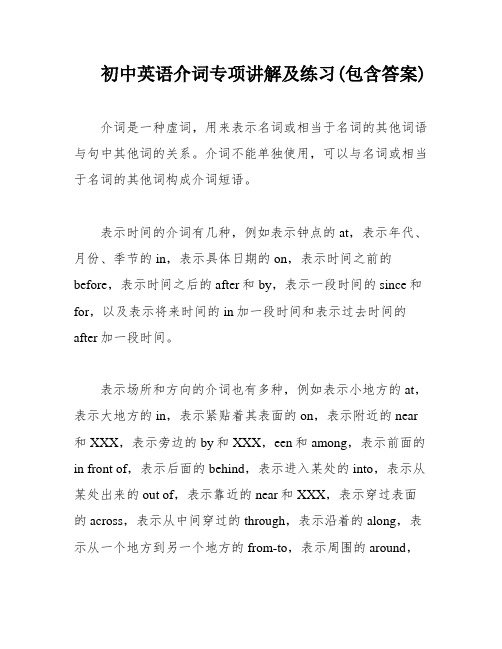
初中英语介词专项讲解及练习(包含答案)介词是一种虚词,用来表示名词或相当于名词的其他词语与句中其他词的关系。
介词不能单独使用,可以与名词或相当于名词的其他词构成介词短语。
表示时间的介词有几种,例如表示钟点的at,表示年代、月份、季节的in,表示具体日期的on,表示时间之前的before,表示时间之后的after和by,表示一段时间的since和for,以及表示将来时间的in加一段时间和表示过去时间的after加一段时间。
表示场所和方向的介词也有多种,例如表示小地方的at,表示大地方的in,表示紧贴着其表面的on,表示附近的near和XXX,表示旁边的by和XXX,een和among,表示前面的in front of,表示后面的behind,表示进入某处的into,表示从某处出来的out of,表示靠近的near和XXX,表示穿过表面的across,表示从中间穿过的through,表示沿着的along,表示从一个地方到另一个地方的from-to,表示周围的around,表示正上方的over,表示正下方的under,表示斜上方的above,表示斜下方的below。
介词的使用需要根据具体情况来判断,掌握介词的用法可以帮助我们更准确地表达自己的意思。
In using a language。
it'XXX to know about the culture and customs of the people you are XXX my experience。
as someone who has lived in different countries。
it's important to adapt and be respectful。
just like you would in your own country.With the right clothing and knowledge。
you can XXX。
完整版)初中介词讲解及练习题
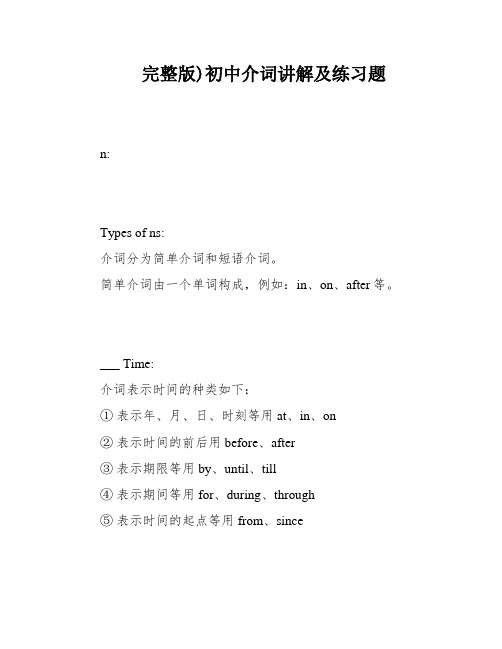
完整版)初中介词讲解及练习题n:Types of ns:介词分为简单介词和短语介词。
简单介词由一个单词构成,例如:in、on、after等。
___ Time:介词表示时间的种类如下:①表示年、月、日、时刻等用at、in、on②表示时间的前后用before、after③表示期限等用by、until、till④表示期间等用for、during、through⑤表示时间的起点等用from、sinceExamples:1) at、on、inA。
at:用于表示时间的某一点例如:at ___在午饭时、___早餐时、___正午时、___那时、___在夜间、___此刻、目前、___目前、___(o’clock)在九点钟、at first开始的时候、起初、at/on the weekend在周末、at last最后、at the same time同时、at times偶尔、有时、at the end of 1999在1999年末、at this time of(the)year在一年中的这个时候。
例如:We usually have ___ ___.我们通常中午吃午饭(十二点吃午饭)。
B。
on:用于表示某天、某一天的上、下午(指具体的某一时,一律用on)例如:on ___在周一、on ___在周二早上、on June 6在6月6日、on May 4,1996在1996年5月4日、on a cold night在一个寒冷的夜晚、on that day在那天、on Christmas Day在圣诞节那天、on time准时、___在周一晚上。
___表示“到……为止”,常用于表示时间或完成某个动作的期限___。
我需要在明天之前完成这份报告。
___ to come by 5 o'clock。
他承诺在5点之前到达。
___表示“直到……为止”,常用于表示时间或某个动作的持续时间___ ___。
她等到午夜才等到她的朋友到来。
(完整word版)初中介词(表时间地点介词)讲解练习及答案.doc
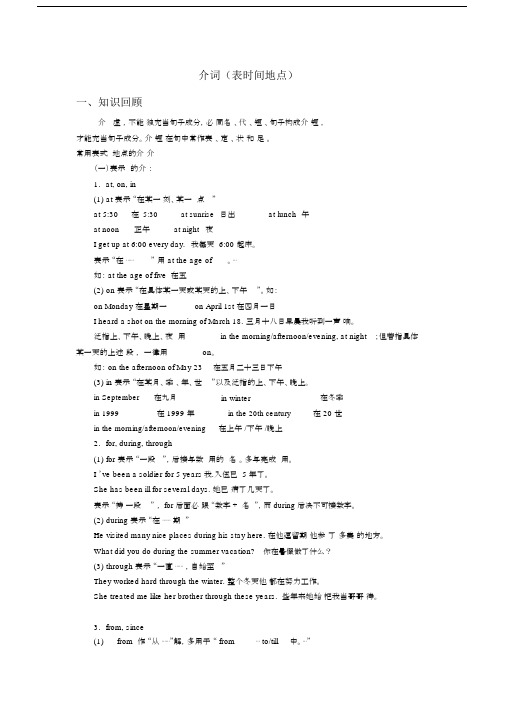
介词(表时间地点)一、知识回顾介虚,不能独充当句子成分,必同名、代、短、句子构成介短,才能充当句子成分。
介短在句中常作表、定、状和足。
常用表式地点的介介(一)表示的介:1. at, on, in(1)at 表示“在某一刻、某一点”at 5:30 在5:30 at sunrise 日出at lunch 午at noon 正午at night 夜I get up at 6:00 every day.我每天6:00起床。
表示“在⋯⋯” 用at the age of。
⋯如: at the age of five 在五(2)on 表示“在具体某一天或某天的上、下午”。
如:on Monday 在星期一on April 1st 在四月一日I heard a shot on the morning of March 18. 三月十八日早晨我听到一声响。
泛指上、下午、晚上、夜用in the morning/afternoon/evening, at night;但若指具体某一天的上述段,一律用on。
如: on the afternoon of May 23在五月二十三日下午(3)in 表示“在某月、季、年、世”以及泛指的上、下午、晚上。
in September 在九月in winter 在冬季in 1999 在 1999 年in the 20th century 在 20 世in the morning/afternoon/evening 在上午 /下午 /晚上2. for, during, through(1)for 表示“一段”,后接与数用的名。
多与完成用。
I ’ve been a soldier for 5 years我.入伍已 5 年了。
She has been ill for several days. 她已病了几天了。
表示“持一段” , for 后面必跟“数字 +名”,而 during 后决不可接数字。
第05练介词-2022年七年级英语(广州深圳版)(原卷版)

第05练介词基础积累介词具体用法例子at in on at后接“时间点”或用于某些词组中(在六点钟)________________,at the moment,(在十点十五分)____________________,at night,at last,(在······结束时)_______________________A.in用在较长的一段时间(世纪、朝代、年、季节、月份等)前B.in用在泛指的上下午、傍晚前in the morning/afternoon/evening,in the summer vacation,(在现代),_____________________(在他20多岁时)_________________,(在两天内)_____________________A.on用在“月份的日子”或“星期的日子”前B.on 用在具体的日子、节日前C.on用在某个特定的早、中、晚前on May 1st, on Sundays,on Mother's Day/NewYear's Day, on the morning of May 1st, on a coldmorningsince for from since+时间点/过去时的句子(现在完成时)I have been in China since 2001.(时间点)for+一段时间(现在完成时)I have stayed in China for 16 years.(时间段)from. . .to. . . 表“从······到. . ”(不能用完成时)3.学生们从周一到周五上学。
________________________________________________before after in before 表“在······之前” 4.餐前请洗手。
Unit4 时间介词 七上单元语法知识点与题型精练 含解析(新牛津译林版)

04 表示时间的介词第一部分时间介词语法知识梳理时间介词表示"时间"的介词如下:①表示年、月、日、时刻等用at, in, on②表示时间的前后用before, after③表示时间的起点等用from④表示时间的经过等用at, on, inat用于表示时刻、时间的某一点at lunch在午饭时a t breakfast早餐时at noon正午时at night在夜间at that time那时at the moment此刻,目前at the same time同时at times偶尔,有时at nine在九点钟at first开始的时候,起初at last最后►We usually have lunch at noon/ at twelve. 我们通常中午吃午饭(十二点吃午饭)。
注意:表示时间的名词前有this, last, next, every等修饰时,其前面不加介词。
this morning今天早上last Monday上周一every week每周on用于表示某天,某一天的上、下午(指具体的某一时,一律用on)on Monday 在周一on Monday evening 在周一晚上on Tuesday morning 在周二早上on June 6在6月6日on May 4,2016 在2016年5月4日on a cold night在一个寒冷的夜晚on that day在那天on Christmas Day在圣诞节那天on time准时on the night of July(the)first 在七月一日的夜晚►We didn’ t listen to the lecture on Wednesday afternoon. 周三下午我们没去听演讲。
in用于表示周、月、季节、年和泛指的上午、下午、晚上(指在一段时间内)。
in the week在这周in the holiday在假期中in May 在五月in 1995在1995年in summer在夏季in Spring在春季in autumn在秋季in winter在冬季in September, 1995 在1995年9月in the morning 在上午in the afternoon 在下午in the evening在晚上in the 21st century在二十一世纪in time及时in an hour一个小时后in a minute一会儿,立刻►People go skating in winter.人们冬天去滑冰。
初一英语介词用法总结练习题20题(带答案)
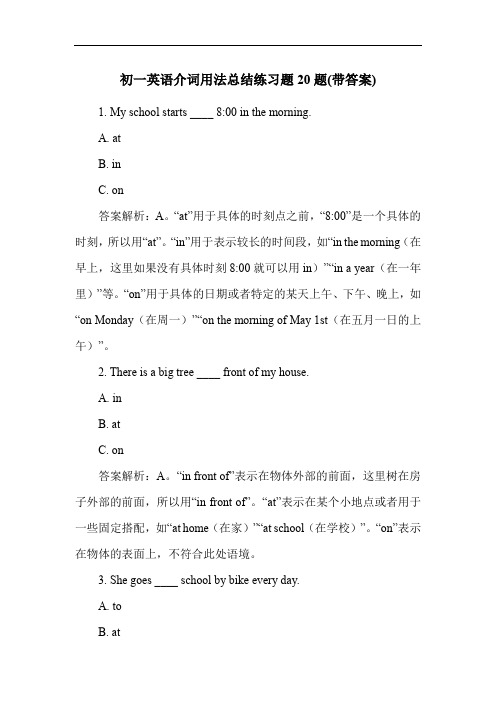
初一英语介词用法总结练习题20题(带答案)1. My school starts ____ 8:00 in the morning.A. atB. inC. on答案解析:A。
“at”用于具体的时刻点之前,“8:00”是一个具体的时刻,所以用“at”。
“in”用于表示较长的时间段,如“in the morning( 在早上,这里如果没有具体时刻8:00就可以用in)”“in a year 在一年里)”等。
“on”用于具体的日期或者特定的某天上午、下午、晚上,如“on Monday 在周一)”“on the morning of May 1st 在五月一日的上午)”。
2. There is a big tree ____ front of my house.A. inB. atC. on答案解析:A。
“in front of”表示在物体外部的前面,这里树在房子外部的前面,所以用“in front of”。
“at”表示在某个小地点或者用于一些固定搭配,如“at home( 在家)”“at school( 在学校)”。
“on”表示在物体的表面上,不符合此处语境。
3. She goes ____ school by bike every day.A. toB. atC. in答案解析:A。
“go to school”是固定搭配,表示去上学,“to”表示方向,指向学校这个目的地。
“at”和“in”不符合这个搭配的用法。
4. My birthday is ____ July.A. inB. onC. at答案解析:A。
“in”用于表示在某个月份,“July( 七月)”是月份,所以用“in”。
“on”用于具体日期,“at”用于具体时刻,都不符合这里的用法。
5. The cat is sleeping ____ the chair.A. underB. inC. on答案解析:A。
“under”表示在物体的下方,猫在椅子下面睡觉,所以用“under”。
(完整)初中英语七年级时间介词详解及练习
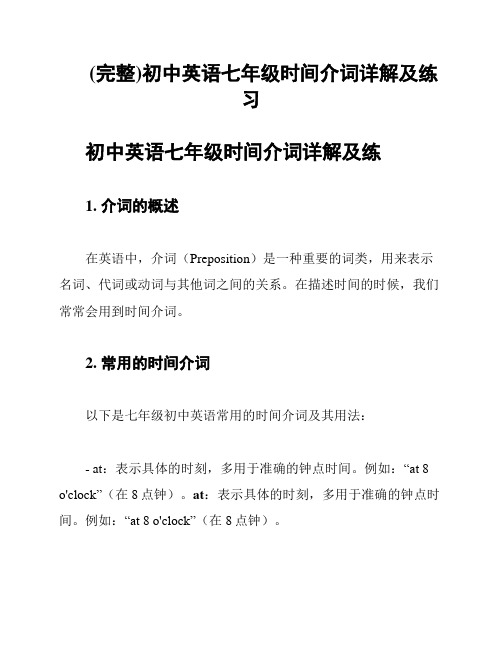
(完整)初中英语七年级时间介词详解及练习初中英语七年级时间介词详解及练1. 介词的概述在英语中,介词(Preposition)是一种重要的词类,用来表示名词、代词或动词与其他词之间的关系。
在描述时间的时候,我们常常会用到时间介词。
2. 常用的时间介词以下是七年级初中英语常用的时间介词及其用法:- at:表示具体的时刻,多用于准确的钟点时间。
例如:“at 8 o'clock”(在8点钟)。
at:表示具体的时刻,多用于准确的钟点时间。
例如:“at 8 o'clock”(在8点钟)。
- on:表示具体的某一天或日期。
例如:“on Monday”(在星期一)。
on:表示具体的某一天或日期。
例如:“on Monday”(在星期一)。
- in:表示较长的时间段,如月份、季节、年份等。
例如:“in July”(在七月)。
in:表示较长的时间段,如月份、季节、年份等。
例如:“in July”(在七月)。
- during:表示某一段时间内发生的事情。
例如:“during the summer vacation”(在暑假期间)。
during:表示某一段时间内发生的事情。
例如:“during the summer vacation”(在暑假期间)。
- for:表示持续的时间。
例如:“for three hours”(持续三个小时)。
for:表示持续的时间。
例如:“for three hours”(持续三个小时)。
练题请根据句意选择适当的时间介词填空:1. I usually go to bed _______ 10 o'clock.2. We have a party _______ Christmas Day.3. They went to the beach _______ their summer vacation.4. Peter studied English _______ three years, and now he speaks it fluently.答案:1. at2. on3. during4. for。
初一英语七年级介词专题讲练
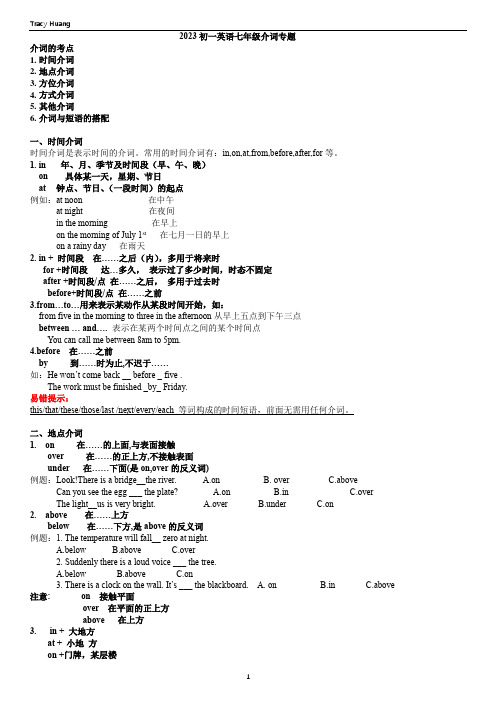
2023初一英语七年级介词专题介词的考点1.时间介词2.地点介词3.方位介词4.方式介词5.其他介词6.介词与短语的搭配一、时间介词时间介词是表示时间的介词。
常用的时间介词有:in,on,at,from,before,after,for等。
1.in年、月、季节及时间段(早、午、晚)on具体某一天,星期、节日at钟点、节日、(一段时间)的起点例如:at noon 在中午at night 在夜间in the morning 在早上on the morning of July 1st在七月一日的早上on a rainy day 在雨天2. in + 时间段在……之后(内),多用于将来时for +时间段达…多久,表示过了多少时间,时态不固定after +时间段/点在……之后,多用于过去时before+时间段/点在……之前3.from…to…用来表示某动作从某段时间开始,如:from five in the morning to three in the afternoon从早上五点到下午三点between … and…. 表示在某两个时间点之间的某个时间点You can call me between 8am to 5pm.4.before 在……之前by 到……时为止,不迟于……如:He won’t come back __ before _ five .The work must be finished _by_ Friday.易错提示:this/that/these/those/last /next/every/each 等词构成的时间短语,前面无需用任何介词。
二、地点介词1.on 在……的上面,与表面接触over 在……的正上方,不接触表面under 在……下面(是on,over的反义词)例题:Look!There is a bridge__the river. A.on B. over C.above Can you see the egg ___ the plate? A.on B.in C.overThe light__us is very bright. A.over B.under C.on2. above 在……上方below 在……下方,是above的反义词例题:1. The temperature will fall__ zero at night.A.belowB.aboveC.over2. Suddenly there is a loud voice ___ the tree.A.belowB.aboveC.on3. There is a clock on the wall. It’s ___ the blackboard. A. on B.in C.above 注意: on 接触平面over 在平面的正上方above 在上方3. in + 大地方at + 小地方on +门牌,某层楼例题: 1.My uncle live ___ F12 __the fifth floor.A.at, onB. in,onC.on, at2.They arrived ___Beijing at 12:00 and waited for a bus ___ the station to the hotel.A.at, inB. in, onC. in, at4.behind 用来表示在某物的后面,与in front of意思相反。
- 1、下载文档前请自行甄别文档内容的完整性,平台不提供额外的编辑、内容补充、找答案等附加服务。
- 2、"仅部分预览"的文档,不可在线预览部分如存在完整性等问题,可反馈申请退款(可完整预览的文档不适用该条件!)。
- 3、如文档侵犯您的权益,请联系客服反馈,我们会尽快为您处理(人工客服工作时间:9:00-18:30)。
初一英语时间介词专项练习( ) 1. Children get gifts ____ Christmas and ____ their birthdays.A. on; onB. at; onC. in; inD. in; on( ) 2.----There is nothing ____tomorrow afternoon, is there?-----No. We can have a game of table tennis.A. onB. inC. outD. up( ) 3. A lot of students in our school were born____March, 1981.A. inB. atC. onD. since( ) 4. He suddenly returned____ a rainy night.A. onB. atC. inD. during( ) 5. My grandfather was born____Oct. 10, 1935.A. onB. inC. atD. of( ) 6. The train is starting___five minutes.A. inB. atC. forD.still( ) 7. Mike does his exercises ____ seven _____ the evening.A. on; toB. at; inC. by; ofD. at; on( ) 8. Children wake up very early____the morning of Christmas Day.A. inB. onC. forD. at( ) 9 ____ a cold winter morning, I met her in the stfeet.A. InB. OnC. AtD. For( ) 10 It happened to be very cold____ the morning of our sports meeting.A. atB. onC. withD. of( ) 11. Why did you get up so early ___ this morning.A. onB. /C. atD. in( ) 12. He went to Shanghai___ September 3, 1991 and came back___ a cold morning last year.A. in; onB. on; inC. on; onD. in; ia( ) 13. Lucy was born____ the night of May 12, 1984. . ...A. onB. inC. atD. to( ) 14. Mrs Brown came to China ____ 1996.A.onB. ofC. to,D. in( ) 15 ___ the morning of November 20, 1915, the workers came to Chicago to show their mourning of Joe Hill.A. OnB. InC. ForD. At( ) 16. Ann moved___Hangzhou___September, 1992.A. /; inB. to; inC. to; on D, in; in( ) 17. They started off___an autumn afternoon.A. duringB. atC. inD. on( ) 18. He often goes ____ school ____ six thirty ____ the morning.A. for; to; inB. to; at; inC. to; for; at D, for; at; to( ) 19. He arrived ___ Shanghai ___ 9: 30 ___ March 5.A. at; in; atB. to; on; atC. in; on; atD. in; at; on( ) 20.The English teacher told me to get there____ half past ten.A: in B. at C. on D. Of1.It is half ______ two.表示三十分钟及三十分钟以内的时刻,用介词past,故选C。
A.toB.tillC.pastD.at2.They have been friends _____2000.A.forB.sinceC.inD.on【解析】:此句意为“自从2000年以来,他们一直是朋友。
”“since+过去时间点” : 表示“自从….以来”,常用现在完成时,故选B。
3.He finished the exam ______an hour.A.withinB.atC.forD.on【解析】:at常后接时刻,而此处是时间段,所以不能用at;“for+时间段”表示长达多长时间,常与持续性动词连用,而finish是短暂性动词,所以不能用for;on不接时间长度,所以此处不用on。
within+时间段:在….之内;within用于此,此句意为“他在一小时之内完成考试。
”故选A。
4.It is almost two o’clock. Look, it’s three____two.A.toB.tillC.pastD.at【解析】:to:用于表示超过30分的时刻,表示“差”。
此处意为“ 差不多两点了。
看,一点五十七分了(两点差三分)。
”故选A。
5.The show will begin _____ten minutes.A.afterB.beforeC.forD.in【解析】:此句意为“表演将于十分钟后开始。
”before在…之前,for长达…,这两个介词用于此均不符合语意。
而“in+时间段”表示多久之后,用于将来时;“after+ 时间段”表示在….之后,常用于过去时,故选D。
6.I have been learning English ______ten years.A.duringB.forC.sinceD.in【解析】:During在…期间,since自从…起,in表示年月等。
此句意为“我已经学英语十年了。
”用“for+时间段”表示长达多长时间,故选B。
7.They came back _______two days.A.afterB.beforeC.forD.in【解析】:“before+时间点”表示在…之前,before不能后接时间段,据此排除B(此处若要表示两天前,要用two days ago)。
“for+时间段”表示长达多长时间,常与持续性动词连用,而come 是短暂性动词,所以不能用for;“in+时间段”表示多久之后,用于将来时,而此处是过去时,所以不能用in;“after+ 时间段”表示在….之后,常用于过去时,可用于此,故选A。
8.You must be home ______ten o'clock.A.onB.inC.byD.during【解析】:on/in/during不能后接时刻,by ten o’clock表示在十点之前,故选C。
9.She came to the library _____6:30 and stayed _______10:30.A.at , atB.before , duringC.at ,until D.during, before【解析】:during不后接时刻,据此排除BD;若A选项用于此,句意不符合逻辑。
用C选项,句意才符合逻辑:“她在六点半的时候来到图书馆,然后一直待到十点半。
”故选C。
10.She didn’t go home _________ten.A.untilB.duringC.forD.in【解析】:此句意为“她直到十点才回家。
”“not….until/till” 表示“直到…..才”,故选A1.I went shopping ____ Sunday afternoon.正确答案:on【解析】:表示在某一天的上午、下午或晚上,用介词on。
2.What happened ____ June 13, 2008. 正确答案:on【解析】:表示在具体某一天,用介词on。
3.We had a maths test ____ Thursday. 正确答案:on【解析】:表示在具体某一天,用介词on。
4.Don’t go out ____ night.正确答案:at【解析】:at night 在晚上,固定搭配。
5.Gina’s birthday is____ September.正确答案:in【解析】:表示在某个月份,用介词in。
6.The party will be held ___the end of this month.正确答案:at【解析】:固定搭配at the end of…在…的末尾,at the end of this month在这个月末。
7.Don’t be late. The class willbegin ___ 8:30.正确答案:at【解析】:表示具体时刻,用at。
8.Jhon was born ____1980.正确答案:in【解析】:表示具体年份,用in9.She has slept ___ a few hours.正确答案:for【解析】:for+时间段,表示长达多长时间。
10.They always go swimming ___ summer.正确答案:in【解析】:表示在某个季节,用介词in。
11.John was very tired. He fellasleep ___ the film.正确答案:during【解析】:during在…期间,原文表示他在看电影期间睡着了。
12.We will come back___ two months. 正确答案:in【解析】:in +时间段,表示多久之后,常用于将来时态。
13.We crossed the line ___the same time.正确答案:at【解析】:at the same time同时。
14.The work should be done ___ six o’clock at the latest.正确答案:by【解析】:by不迟于,原文表示工作最迟应当在6点之前(不迟于6点)完成。
15.We haven’t spoken to eachother ___ last week.正确答案:since【解析】:since自从…起。
